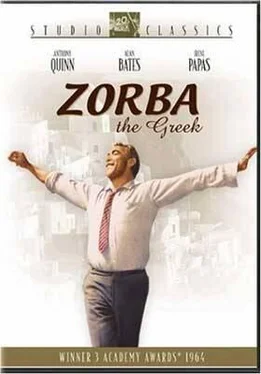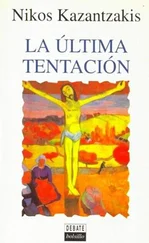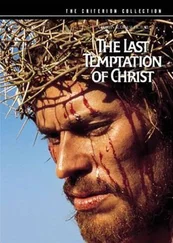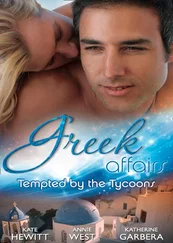Nikos Kazantzakis - Zorba The Greek
Здесь есть возможность читать онлайн «Nikos Kazantzakis - Zorba The Greek» весь текст электронной книги совершенно бесплатно (целиком полную версию без сокращений). В некоторых случаях можно слушать аудио, скачать через торрент в формате fb2 и присутствует краткое содержание. Жанр: Современная проза, на английском языке. Описание произведения, (предисловие) а так же отзывы посетителей доступны на портале библиотеки ЛибКат.
- Название:Zorba The Greek
- Автор:
- Жанр:
- Год:неизвестен
- ISBN:нет данных
- Рейтинг книги:3 / 5. Голосов: 1
-
Избранное:Добавить в избранное
- Отзывы:
-
Ваша оценка:
- 60
- 1
- 2
- 3
- 4
- 5
Zorba The Greek: краткое содержание, описание и аннотация
Предлагаем к чтению аннотацию, описание, краткое содержание или предисловие (зависит от того, что написал сам автор книги «Zorba The Greek»). Если вы не нашли необходимую информацию о книге — напишите в комментариях, мы постараемся отыскать её.
Zorba The Greek — читать онлайн бесплатно полную книгу (весь текст) целиком
Ниже представлен текст книги, разбитый по страницам. Система сохранения места последней прочитанной страницы, позволяет с удобством читать онлайн бесплатно книгу «Zorba The Greek», без необходимости каждый раз заново искать на чём Вы остановились. Поставьте закладку, и сможете в любой момент перейти на страницу, на которой закончили чтение.
Интервал:
Закладка:
A large shooting star streaked across the sky. Zorba started and opened wide his eyes as if he were seeing a shooting star for the first time in his life.
"Did you see that star?" he asked.
"Yes."
We were silent.
Suddenly Zorba craned his scraggy neck, puffed out his chest and gave a wild, despairing cry. And immediately the cry canalized itself into human speech, and from the depths of Zorba's being rose an old monotonous melody, full of sadness and solitude. The heart of the earth itself split in two and released the sweet, compellíng poison of the East. I felt inside me all the fibers still linking me to courage and hope slowly rotting.
Iki kiklik bir tependé otiyor Otme dé, kiklik, bemin dertim yetiyor, aman! aman!
Desert, fine sand, as far as eye can see. The shimmering air, pink, blue, yellow; your temples bursting. The soul gives a wild cry and exults because no cry comes in response. My eyes filled with tears.
A pair of red-legged partridges were piping on a hillock; Partridges, pipe no more! My own suffering is enough for me, aman! aman!
Zorba was silent. With a sharp movement of his fingers he wiped he sweat off his brow. He leaned forward and stared at the ground.
"What is that Turkish song, Zorba?" I asked after a while.
"The camel driver's song. It's the song he sings in the desert. I hadn't sung it or remembered it for years. But just now…"
He raised his head, his voice was sharp, his throat constricted.
"Boss," he said, "it's time you went to bed. You'll have to get up at dawn tomorrow if you're going to catch the boat at Candia. Good night!"
"I'm not sleepy," I said. "I'm going to stay up with you. This is our last night together."
"That's just why we must end it quickly!" he cried, turning down his empty glass as a sign he did not wish to drink any more. "Here and now, just like that. As men cut short smoking, wine, and cards. Like a Greek hero, a Palikari,
"My father was a real Palikari. Don't look at me, I'm only a breath of air beside him. I don't come up to his ankles. He was one of those ancient Greeks they always talk about. When he shook your hand he nearly crushed your bones to pulp. I can talk now and then, but my father roared, neighed and sang. There very rarely came a human word out of his mouth…
"Well, he had all the vices, but he'd slash them, as you would with a sword. For instance, he smoked like a chimney. One morning he got up and went into the fields to plough. He arrived, leaned on the hedge, pushed his hand into his belt for his tobacco pouch to roll a cigarette before he began work, took out his pouch and found it was empty. He'd forgotten to fill it before leaving the house.
"He foamed with rage, let out a roar, and then bounded away towards the village. His passion for smoking completely unbalanced his reason, you see. But suddenly-I've always said I think a man's a mystery-he stopped, filled with shame, pulled out his pouch and tore it to shreds with his teeth, then stamped it in the ground and spat on it. 'Filth! Filth!' he bellowed. 'Dirty slut!'
"And from that hour, until the end of his days, he never put another cigarette between his lips.
"That's the way real men behave, boss. Good night!"
He stood up and strode across the beach. He did not look back
once. He went as far as the fringe of the sea and stretched himself out there on the pebbles.
I never saw him again. The muleteer arrived before cock-crow. I climbed into the saddle and left. I may be mistaken, but I suspect that Zorba was hidden somewhere about, watching me leave, though he did not run up to say the usual words of farewell, to make us sad and tearful, to shake hands and wave handkerchiefs and exchange vows.
Our separation was as clean as a sword cut.
In Candia I was given a telegram. I took it with trembling hands and looked at it for some time before I opened it. I knew what it said. I could see with a terrifying certainty the number of words, even the number of letters it contained.
I was seized with the desire to tear it to pieces without opening it. Why read it when I knew what was inside? But we no longer have faith in our souls, alas! Reason, the eternal grocer, laughs at the soul, as we ourselves laugh at witches and old women who cast spells. Or at eccentric old ladies. So I opened the telegram. It was from Tiflis. For a moment the letters danced before my eyes, I could not make out a word. But slowly they came to a standstill and I read:
YESTERDAY AFTERNOON STAVRIDAKI DIED FROM PNEUMONIA.
Five years went by, five long years of terror, during which time gathered speed, and geographical frontiers joined the dance, national boundaries expanded and contracted like so many concertinas. Zorba and I were carried away by the storm; though from time to time, in the first three years, I had a brief card from him.
One from Mount Athos -a card of the Virgin, Guardian of the Gates, with her big sad eyes and her strong and determined chin. Beneath the Virgin Zorba had written with his thick, heavy pen, which always scratched the paper: "No chance of doing business here, boss! The monks here even fleece their fleas! I'm leaving!" A few days later another card: "I can't go round all these monasteries holding the parrot in my hand like a travelling showman. I made a present of it to a comic sort of monk who had taught a blackbird to whistle Kyrie Eleison beautifully. The little devil sings like a real monk; it shocks you to hear him. He's going to teach our poor parrot to sing, too. Ah! the things that rascal's seen in his lifetime! And now he's become a holy father, our parrot has! All the best. Father Alexios, holy anchorite."
Six or seven months later I had a card from Rumania showing a very buxom woman wearing a low-necked dress.
I'm still alive, I'm eating mamaliga [33]and drinking vodka. I work in the oil mines and am as dirty and stinking as any sewer rat. But who cares? you can find here plenty of all your heart and belly can desire. A real paradise for old rascals like me. Do you understand, boss? A wonderful life… plenty of sweetmeats, and sweethearts into the bargain, God be praised! All the best.
Alexis Zorbescu, sewer rat.
Two years went by. I received another card, this time from Serbia.
I'm still alive. It's hellishly cold, so I've been obliged to get married. Turn over and you'll see her face-a fine bit of female stuff. She's a trifle fat about the middle because she's cooking up a little Zorba for me. I am standing at her side wearing the suit you gave me, and the wedding ring you see on my hand is poor old Bouboulina's-nothing is impossible! God bless her remains! This one's name is Lyuba. The coat with fox-fur collar I'm wearing is part of my wife's dowry. She also brought me a mare and seven pigs-a funny lot they are! And two children from her first marriage, because I forgot to say she was a widow. I've found a copper mine in a mountain close by here. I've managed to get round another capitalist and am now taking it very easy, like a pasha. All the best.
Alexis Zorbic', ex-widower.
On the back of the card was a photograph of Zorba in splendid form, dressed as a newlywed, with a fur cap and a long new overcoat and carrying a swagger cane. On his arm was a beautiful Slav woman of no more than twenty-five, a wild mare with generous haunches, looking tempting and roguish, wearing high boots and graced with an ample bosom. Beneath the photograph was some more of Zorba's pot-hooked writing: "Me, Zorba, and that unending business, women-this time her name's Lyuba."
All those years I was travelling abroad. I also had my unending business, but it had no ample bosom, no new coat, no pigs to give me.
One day in Berlin came a telegram: FOUND A WONDERFUL GREEN STONE. COME IMMEDIATELY, ZORBA.
It was the time of the great famine in Germany. The mark had fallen so low that you were obliged to carry millions of them about in a suitcase to buy even the smallest thing, like a postage stamp. Famine, cold, worn clothes, shoes full of holes everywhere-and the ruddy German cheeks had grown pale. If there was a slight breeze, men fell down in the street like leaves before the wind. Mothers gave their children pieces of rubber to chew to stop them crying. At night the police kept guard on the bridges across the river to prevent mothers from throwing themselves over, with their children in their arms, just to bring it all to an end somehow.
Читать дальшеИнтервал:
Закладка:
Похожие книги на «Zorba The Greek»
Представляем Вашему вниманию похожие книги на «Zorba The Greek» списком для выбора. Мы отобрали схожую по названию и смыслу литературу в надежде предоставить читателям больше вариантов отыскать новые, интересные, ещё непрочитанные произведения.
Обсуждение, отзывы о книге «Zorba The Greek» и просто собственные мнения читателей. Оставьте ваши комментарии, напишите, что Вы думаете о произведении, его смысле или главных героях. Укажите что конкретно понравилось, а что нет, и почему Вы так считаете.












